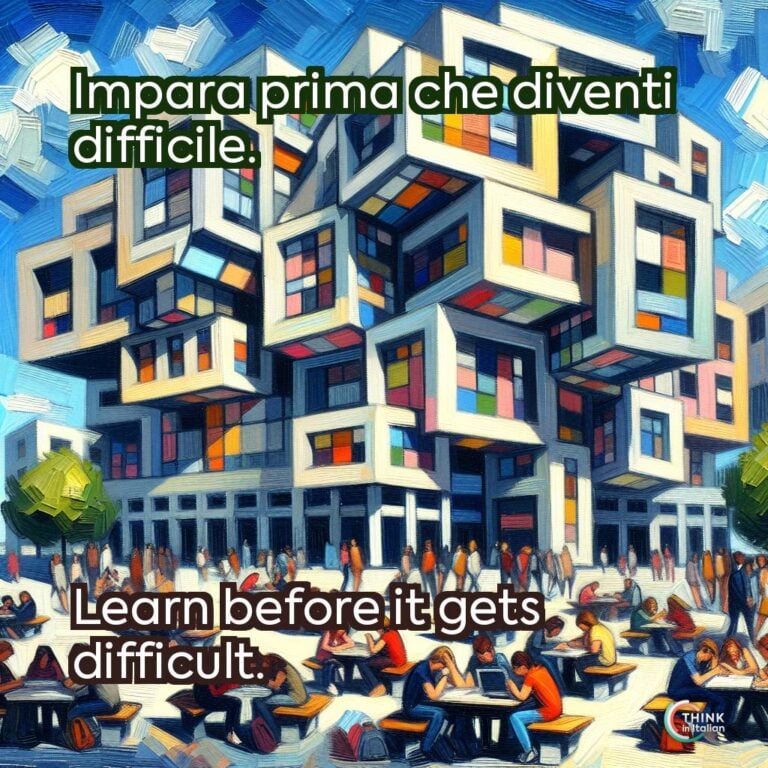“Prima” in Italian
In Italian, the word “prima“ has multiple meanings and uses, which can be quite contextual. It generally translates to “before” “first“, or “earlier” and has two main grammatical applications:
- As an adjective: It can also be used as a feminine singular adjective meaning “first”, for instance, La prima volta (The first time).
- As an adverb: When used as an adverb, it typically means “before” or “earlier”, as in Vieni prima di cena (Come before dinner). In this case, it can be followed either by “di” or “che” depending on what type of sentence it is introducing. For example:
Torna a casa prima che faccia buio.
Come home before it gets dark.
Prima che vs Prima di
Both prima di and prima che can both be translated as “before” in English. However, in Italian they are used in different contexts. The main difference is thatprima di takes the infinitive, while prima che takes the subjunctive.
Prima di + infinitive
Mettiti la giacca prima di uscire.
Put your jacket on before going out.
Voglio mangiare prima di andare al cinema.
I want to eat before going to the cinema.
Prima che + subjunctive
Prima che tu esca ti devo dire una cosa.
Before you go out, I need to tell you something.
Mangiamo prima che finisca tutto.
Let’s eat before everything finishes.
How to use “Prima che” + Subjunctive?
Prima che is a temporal conjunction which indicates anteriority. As all conjunctions, it is used to combine two sentences: in this case, the action or occurrence described in one sentence happens before the action or occurrence described in the other.
The temporal conjunction prima che is always followed by the subjunctive mood, whether in the present or imperfect tense. Have a look at the examples below.
Present
Spero di arrivare prima che inizi a piovere.
I hope to arrive before it starts raining.
Cuciniamo prima che arrivino i miei, no?
Let’s cook before my parents arrive, shall we?
Imperfect
Ci sarebbe piaciuto arrivare prima che uscissi.
We would have liked to get here before you left.
Sandra voleva partire prima che iniziasse l’estate.
Sandra wanted to leave before the summer started.
Other Conjunctions + Subjunctive
Prima che is not the only Italian conjunction that requires congiuntivo.
Here are some other common ones with corresponding examples:
- A meno che (unless)
Non fidarti del suo parere, a meno che non sia un medico.
Do not trust his opinion unless he is a doctor.
- Sebbene (although)
Sebbene avesse più di cinquant’anni, vinse la gara.
Although she was over 50, she won the competition.
- Nel caso (che) (In case)
Nel caso (in cui) tu non abbia voglia di cucinare, ho preparato una zuppa.
In case you don’t feel like cooking, I prepared a soup.
Did you Know it… Before I Told you?
Lo sapevi, prima che te lo dicessi?
As you might have understood, mastering the phrase “prima che” is essential to communicate complex temporal relationships, conditions, and sequences that are crucial in everyday conversations and storytelling in Italian.
For people aiming at learning Italian, grasping such elements is not only beneficial for fluency but also for engaging deeply with Italian culture.
So, whether you’re planning your next trip to Italy, preparing for an Italian exam, or simply expanding your linguistic skills, pay close attention to these conjunctions and their correct grammatical contexts.
Remember, every step in learning brings you closer to mastering the art of Italian communication—prima che te ne accorga (before you know it)!




